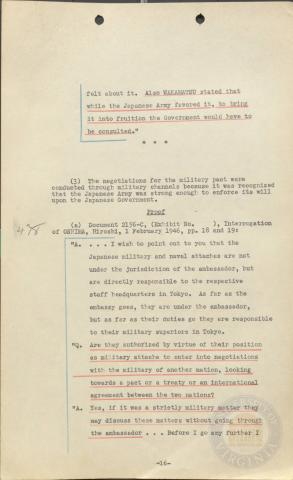
Page 16
| Parent | Collaboration Between Japan, Germany and Italy - Volume II |
|---|---|
| Date | 25 November 1941 |
| Language | English |
| Collection | Tavenner Papers & IMTFE Official Records |
| Box | Box 15 |
| Folder | Japan, Germany, Italy Collaboration Vol 2 |
| Repository | University of Virginia Law Library |
felt about it. A3 so TffiHB™ stated that while the Japanese Army favored it, to bring it into fruition the Government would have to
be constated."
* * *
(3) The negotiations for the military pact were conducted through military channels because it was recognized that the Japanese Army was strong enough to enforce its will upon the Japanese Government*
Proof
(a) Document 2156-C, (Exhibit No* ), Interrogation of OSKIMfc, Hiroshi, 1 February 1946, pp. 18 and 191
WA* ... I wish to point out to you that the
Japanese military and naval attaches are not under the jurisdiction of the ambassador, but are directly responsible to the respective staff headquarters in Tokyo. As far as the embassy goes, they are under the ambassador, bat as far as their duties go they are responsible to their military superiors in Tokyo.
MQ. Are they authorized by virtue of their position as military attache to enter into negotiations with the military of another nation, looking towards a pact or a treaty or an international agreement between the two nations?
"A. Yes, if it was a strictly military matter they may discuss these matters without going through the ambassador ... Before I go any further I
